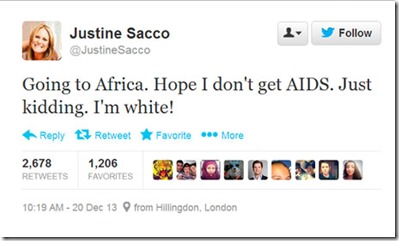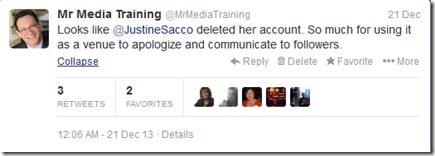Should You Delete Your Twitter Account After A Crisis?
During the holiday break, you probably saw the social media uproar sparked by a tweet sent by Justine Sacco, the communications chief for IAC, the company that owns Match.com, OKCupid, and The Daily Beast.
Don’t worry. That story’s already been covered to death, and I don’t intend to re-litigate it here. But in case you missed it, here’s the tweet she sent:
Unfortunately for Sacco, she sent the tweet immediately before boarding an 11-hour flight from London to South Africa—and since the plane didn’t have WiFi, she had no idea what an uproar she had caused until she landed. While in the air, thousands of people had retweeted her tweet, followed the progress of her flight, and created a custom hashtag, #HasJustineLandedYet.
One question has been nagging me for the past couple of weeks. Within minutes of landing, Sacco deleted her Twitter account. Was she right to do so?
At first, I thought she had made a mistake by doing so:
As I pointed out in my tweet, Twitter could have been a great platform on which to apologize, engage humbly with a few critics, and share links to any longer statements she might have released.
But as I reflected on it, I wondered whether she was right to have deleted her account for the following five reasons (regardless of whether she made such a calculation in advance):
1. Her Twitter Network Was No Longer Hers
Sacco only had a few hundred Twitter followers before this incident but thousands afterward. If she had remained on Twitter, her tweets would have been seen by more people intrigued by the scandal than her core network. Twitter wasn’t a major platform for Sacco’s personal or professional brand. Even if it had been, big personalities such as John Mayer have deleted their accounts without much consequence. Larger brands, however, are a different story.
2. She Starved The Story of Oxygen
The story seemed to lose its energy as soon as she deleted her account. Her account’s erasure seemed to provide a sense of closure to the incident; without being able to include @JustineSacco in tweets, Twitter’s zest for the story appeared to deflate.
3. Tweeters Got Blood, Moved On
While Sacco was still in the air, her company released a statement suggesting she might lose her job over the incident (she did). Once she paid that price, there was less need for further communication from Sacco over Twitter. Instead, she released an apology through a South African newspaper, which was promptly shared on the social network and served to further exhaust the story.
4. The Holidays Were Coming
This incident occurred on December 20 and was almost certain to die a quick death before Christmas Eve. Even if she had been criticized for deleting her Twitter account, that criticism was unlikely to have lasted more than three more days.
5. She Got Sympathy
Overall, Sacco’s tweets were badly damaging. But many Twitter users, bloggers, and journalists raised concern about Twitter’s “vigilante justice,” believing that Sacco had been unfairly convicted without a trial or the ability to defend herself.
My Final Take
Deleting her account didn’t erase her words. Many news stories captured her earlier, incendiary tweets, which will remain “on the record” forever. But the raw record of her Twitter account is no longer “live” and thus cannot be combed through by curiosity seekers.
I usually advise against deleting social media accounts in crisis. But Sacco’s case feels different—and she probably made the right call.
[poll id=”37″]






I think she did the right thing, probably the only thing she could do. This was her personal Twitter account and she has the right to not be there. If she was using it as spokesperson for her employer, it would have been better to stay on, apologize, etc. I wouldn’t be surprised if she re-starts her Twitter under a different handle. Her idiocy will be soon forgotten anyway.
Interesting analysis. I’ve always said that a key to crisis communications is knowing the rules and also knowing when to break them. I don’t think the reason the story lost oxygen was because the twitter account was deleted. Closure came because she was immediately fired and then quickly apologized. That left nothing to be outraged about. And, even though her account had been deleted, Twitter ran with the apology which had been made to a South African newspaper.
I thought her case was a good reminder of think before you speak (and tweet). I have been more curious about why a communications professional would ever make such a huge mistake.
Twitter gives you a 30 day grace period after “deleting” an account where they hold the account before releasing it back into the wild. So in essence you are really deactivating the account at first before letting it go. She may have been better off deleting it and then reactivating it before the 30 day period was over and then making the account private. That way she would still own the account and prevent someone else from taking it over which has now happened.
*
3 + 3 = six